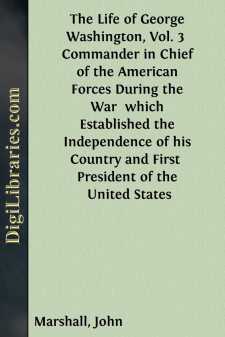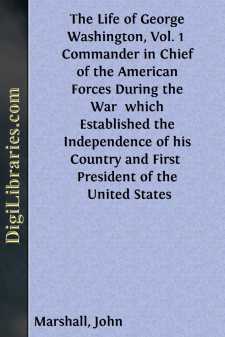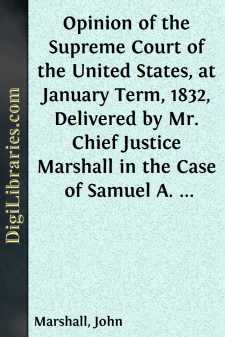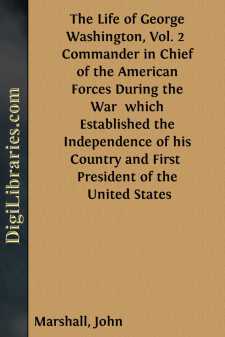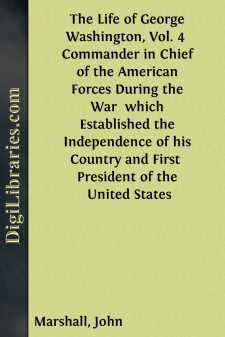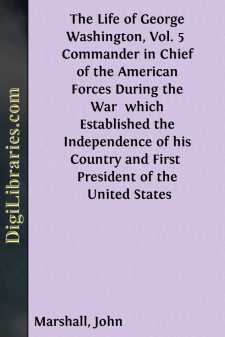Categories
- Antiques & Collectibles 13
- Architecture 36
- Art 48
- Bibles 22
- Biography & Autobiography 813
- Body, Mind & Spirit 142
- Business & Economics 28
- Children's Books 17
- Children's Fiction 14
- Computers 4
- Cooking 94
- Crafts & Hobbies 4
- Drama 346
- Education 46
- Family & Relationships 57
- Fiction 11829
- Games 19
- Gardening 17
- Health & Fitness 34
- History 1377
- House & Home 1
- Humor 147
- Juvenile Fiction 1873
- Juvenile Nonfiction 202
- Language Arts & Disciplines 88
- Law 16
- Literary Collections 686
- Literary Criticism 179
- Mathematics 13
- Medical 41
- Music 40
- Nature 179
- Non-Classifiable 1768
- Performing Arts 7
- Periodicals 1453
- Philosophy 64
- Photography 2
- Poetry 896
- Political Science 203
- Psychology 42
- Reference 154
- Religion 513
- Science 126
- Self-Help 84
- Social Science 81
- Sports & Recreation 34
- Study Aids 3
- Technology & Engineering 59
- Transportation 23
- Travel 463
- True Crime 29
The Life of George Washington, Vol. 3 Commander in Chief of the American Forces During the War which Established the Independence of his Country and First President of the United States
by: John Marshall
Description:
Excerpt
CHAPTER I.
Incursion into Jersey.... General Lacy surprised.... Attempt on Lafayette at Barren Hill.... General Howe resigns the command of the British army.... Is succeeded by Sir H. Clinton.... He evacuates Philadelphia, and marches through the Jerseys.... A council of war which decides against attacking the British on their march.... Battle of Monmouth.... General Lee arrested.... Sentenced to be suspended for one year.... Thanks of congress to General Washington and his army.
1778
The position at Valley Forge had been taken for the purposes of covering the country, protecting the magazines, and cutting off all supplies to Philadelphia. Although the intercourse of the inhabitants with that place could not be entirely prevented; the sufferings of the British army from the scarcity of fresh provisions and forage were considerable; and, as the spring opened, several expeditions were undertaken both to relieve their own wants, and to distress the army of the United States.
About the middle of March, Colonel Mawhood and Major Simcoe, who were detached into Jersey at the head of about twelve hundred men, landed at Salem, nearly opposite Reedy Island, and dispersed the small bodies of militia who were stationed in that part of the country.
General Washington had given early intelligence of this expedition to Governor Livingston; and had requested that he would immediately order out the militia to join Colonel Shreve, whose regiment was detached into Jersey; but the legislature had neglected to make provision for paying them; and the governor could not bring them into the field. Colonel Shreve, on his arrival at Haddonfield, the place at which they had been directed to assemble, found less than one hundred men. March 23.Colonel Ellis, their commanding officer, remarked, in a letter to the governor, that "without some standing force, little was to be expected from the militia, who, being alone not sufficient to prevent the incursions of the enemy, each one naturally consults his own safety, by not being found in arms."
Mawhood, of course, was unrestrained; and the devastation committed by his party was wantonly distressing. Its course of destruction was preceded by a summons to Colonel Hand, the commanding officer of the militia, to lay down his arms, which was accompanied with a threat of the consequences to result from his refusal. This threat was too faithfully executed.
After completing his forage, without molestation, Mawhood returned to Philadelphia. During the continuance of this incursion, which lasted six or seven days, not more than two hundred men could be collected to reinforce Colonel Shreve, who was consequently unable to effect any thing, and did not even march to the lower parts of Jersey, which were plundered without restraint.
May 1.Not long after this incursion into Jersey, an enterprise was undertaken against General Lacy, who, with a small number of Pennsylvania militia, seldom amounting to six hundred, and sometimes not exceeding fifty, watched the roads leading to Philadelphia on the north side of the Schuylkill, and was generally posted within twenty miles of that town.
General Lacy surprised.This expedition was entrusted to Colonel Abercrombie and Major Simcoe, who avoided all the posts Lacy had established for his security, and threw a body of troops into his rear before he discovered their approach. After a short resistance, he escaped with the loss of a few men killed, and all his baggage. His corps were entirely dispersed, and he was soon afterwards relieved by General Potter.
To maintain the command of the water as far as was practicable, congress had ordered impediments to be sunk in many of the rivers of common use, so as to obstruct the passage up them, and had constructed frigates, and other smaller vessels, to be employed above those impediments or elsewhere, as the occasion might require. Several of them had been commenced above Philadelphia, but were not completed when the British obtained the command of the river....


